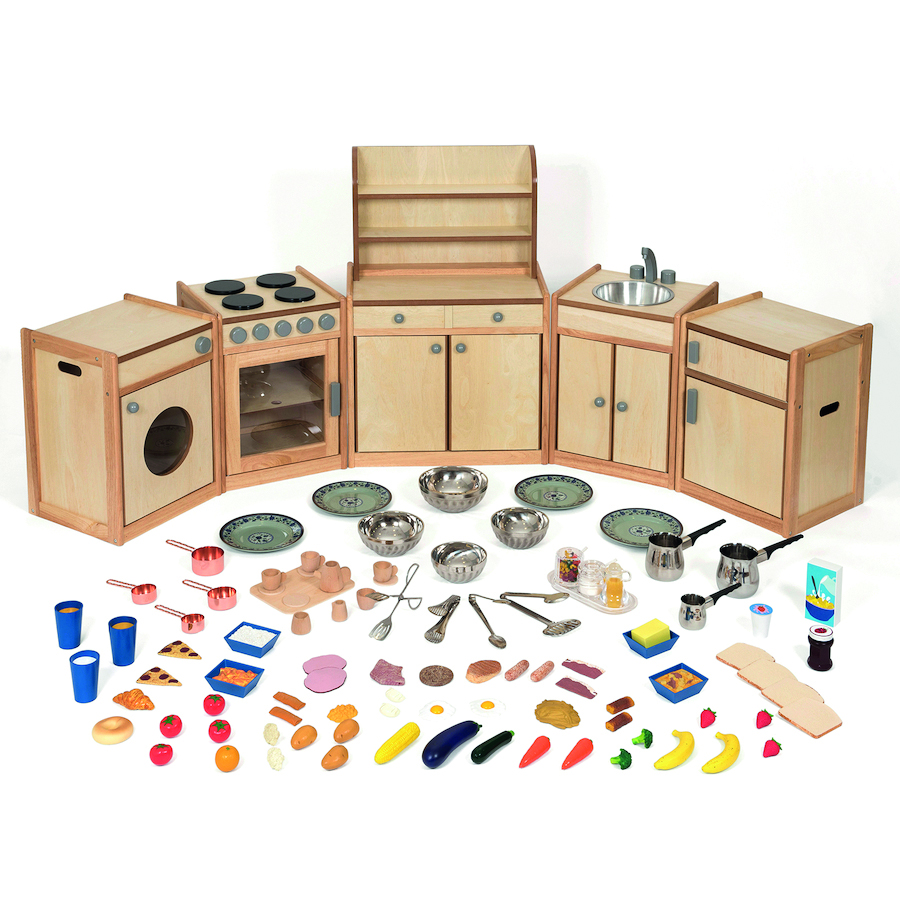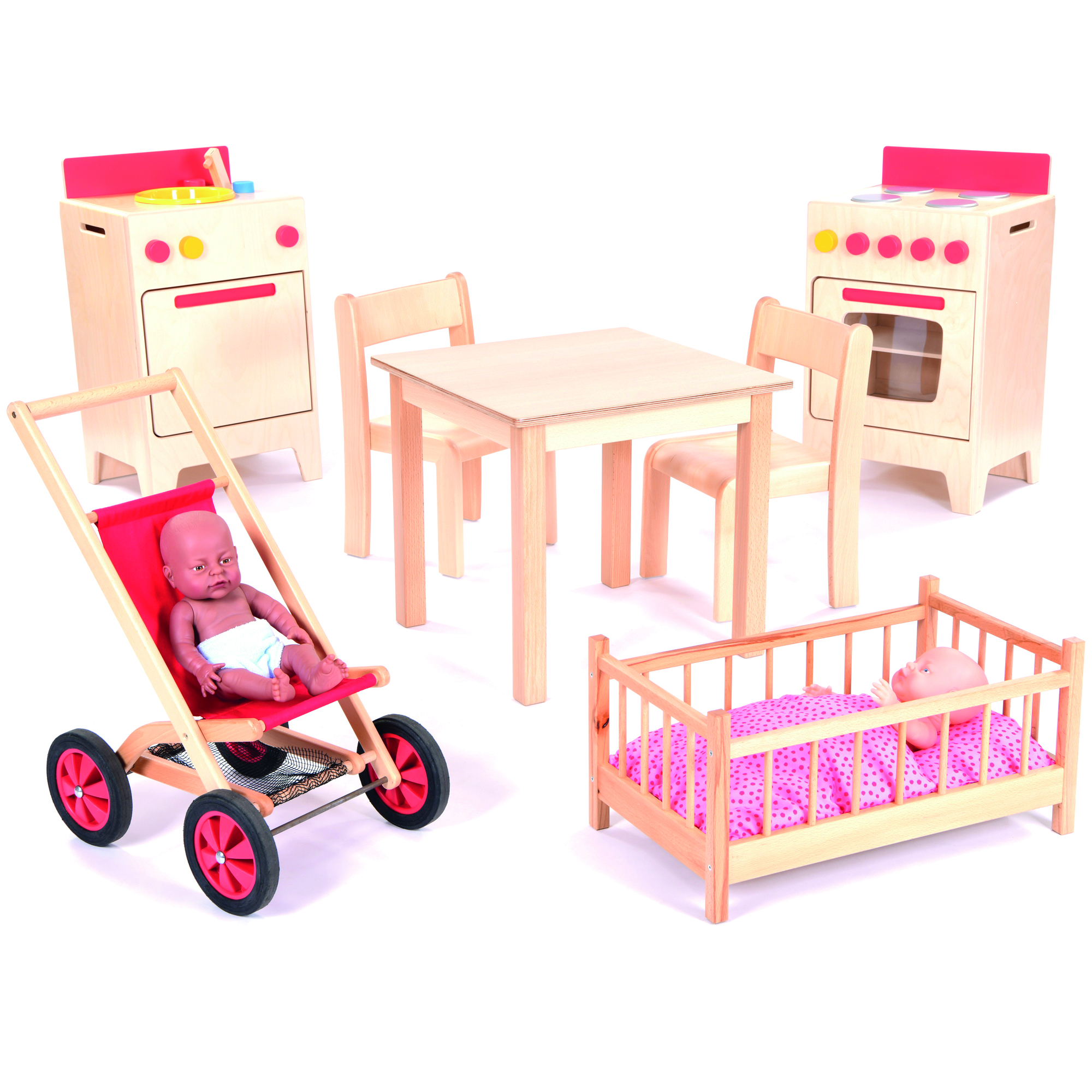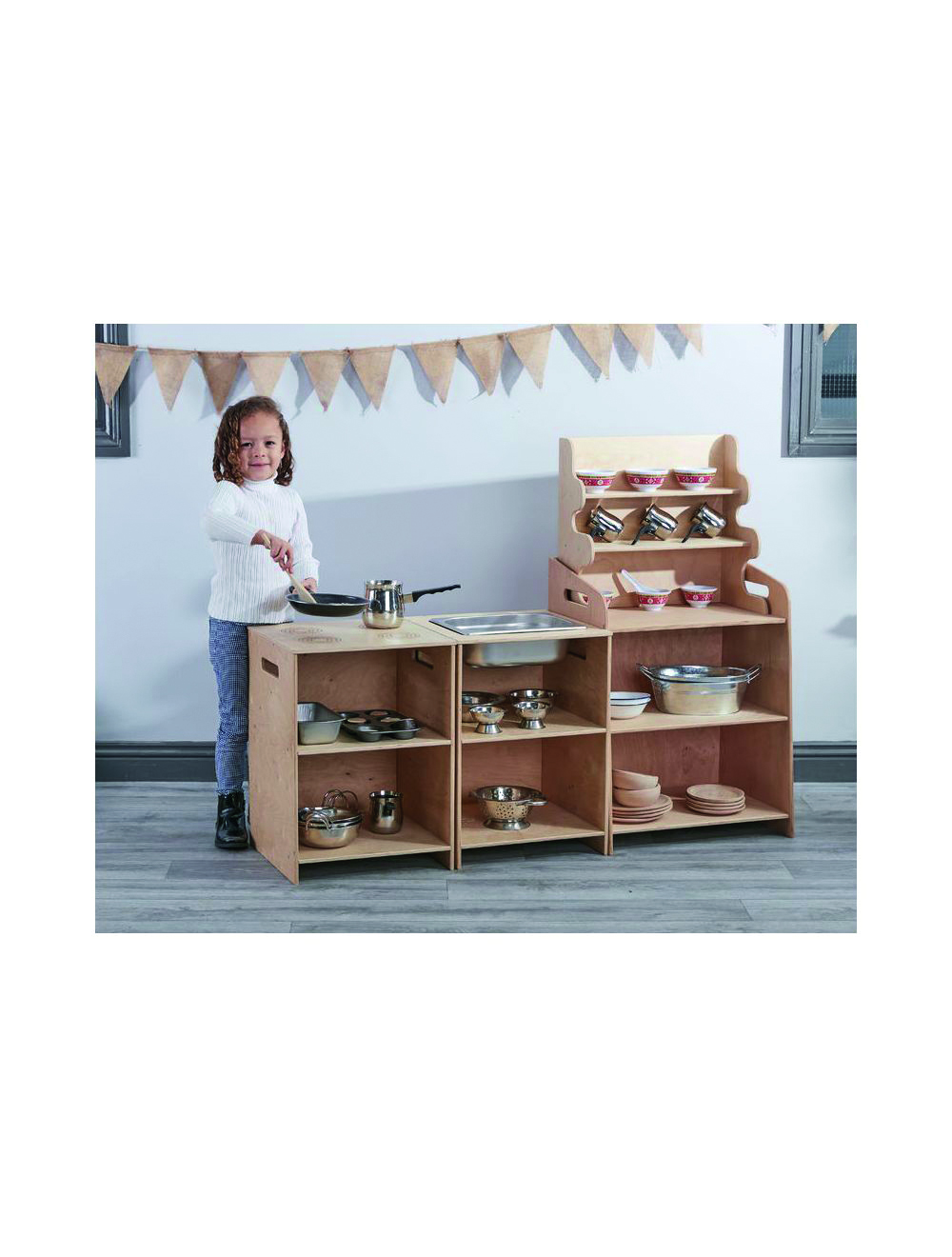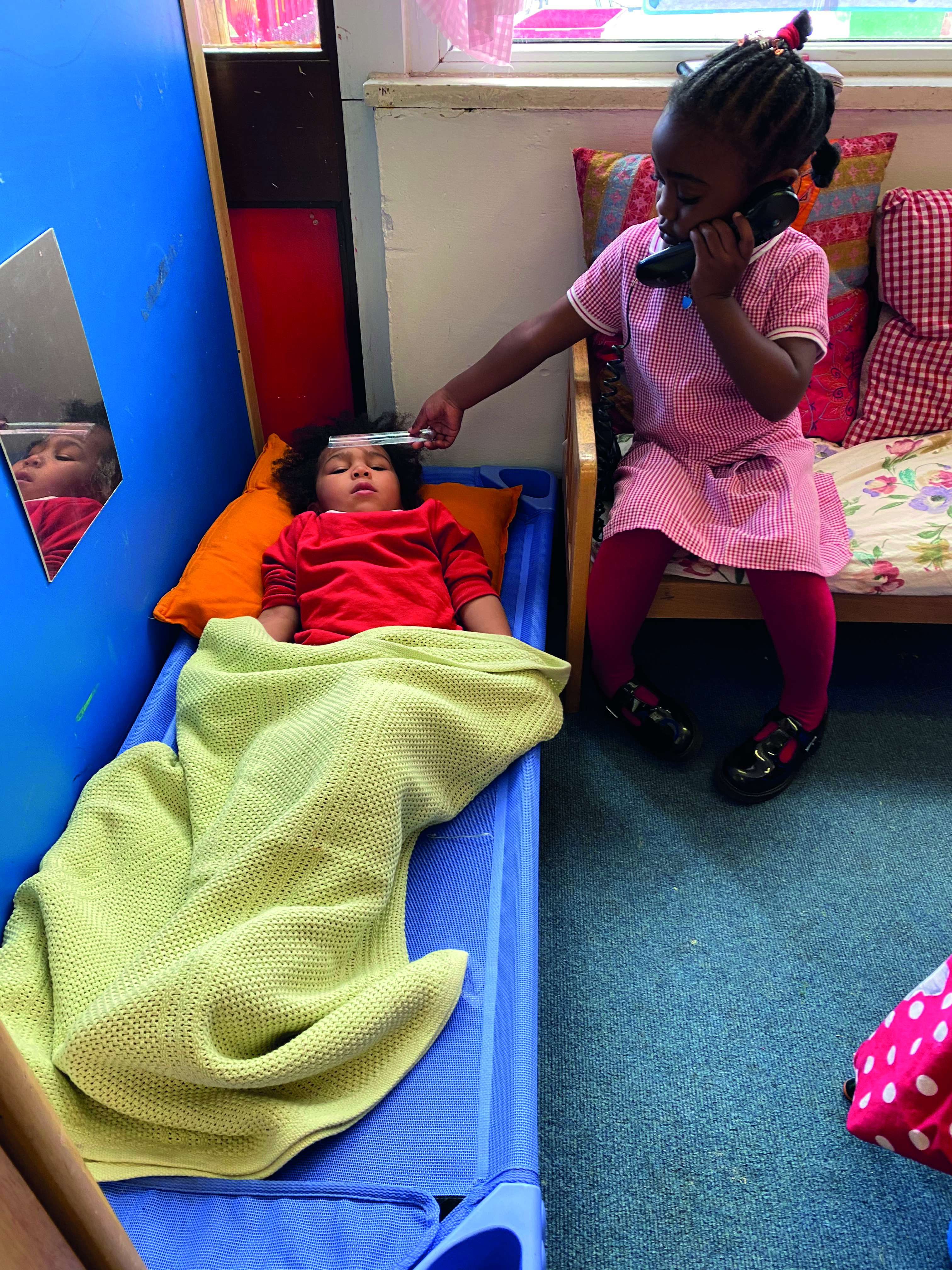
It is no surprise that children have gravitated to nurseries’ home corners since the pandemic began. After all, they have spent the majority of the past year living in their kitchen or lounge, watching family members go about their daily business: working on their laptops, making cups of tea, preparing food, feeding hungry babies, loading the washing machine… the list goes on.
Children who have been unsettled by the pandemic have found particular comfort in this familiar area of the nursery, where they have been able to imitate the roles of their parents and carers through the domestic role-play activities on offer.
Sara Chan, nursery teacher at St Mary Magdalene Church of England Primary School in Westminster, observed a lot of nurturing play in the home corner during January's lockdown, when small groups of key-worker children were attending.
She explains, ‘Children played mummies, daddies and babies, and they formed strong bonds with each other. There was a real sense that they wanted to look after each other.
‘We added a bed to extend the role play because the children wanted to nurse each other. They used resources around the setting, like rulers to test each other's temperature and spoons to give medicine.’
Professor Helen Dodd of Reading University says it is ‘interesting’ that children are using the home corner for this form of role play. ‘It could be that it supports play around illness and hospitals, which they want to do to help make sense of everything that's happened over the past year. Equally, they might feel a sense of comfort playing in the home corner because, after so long at home, it is the most familiar place. When we feel anxious or uncertain, we often seek out things that are more familiar to us.’
FEELING SECURE
Andy Burt, curriculum consultant at Early Excellence and co-author of Understanding Young Children's Learning Through Play(Routledge), says domestic role play allows children to feel secure because they are in an area where they feel like the expert.
For this reason, Early Excellence advocates having a permanent home corner that does not transform into a café or optician's at various points in the year.
Mr Burt says, ‘When you think about children's predictable interests, domestic role play is high on the agenda. That's not to say it can’t be enhanced, for example, with decorations or relevant objects for religious events and cultural festivals, or to reflect children's current interests.’
KEEPING IT REAL
A well-used home corner needs to be carefully thought through and planned for – and the detail is ‘crucial’, explains Mr Burt.
‘It's no use cobbling together a set of clutter; a fridge and washing machine. It should include pots and pans, a baby to feed and all of the different equipment that goes with it; cooking and cleaning equipment, and resources that are as realistic as possible, even down to items of food; plates and cutlery.
‘If there's a washing machine, provide clothing that would go in the machine at home. There are so many conversations to be had around these areas of domestic role play, and practitioners should look to maximise the opportunity to extend children's language and communication. Therefore, detail is key.’
However, Colin Stangl of Community Playthings warns that providing too much detail may ‘stifle the children's imagination’. He says, ‘If the resources are nondescript and simple, true open-ended play will evolve. Children will then bring their own unique culture into the play as their imagination takes over. If nothing is prescribed then nothing will be wrong.’
He adds, ‘Simple furniture imitating familiar fixtures children see at home are helpful to give a framework and theme to the play. Simple loose parts such as pots, pans, containers, perhaps wooden spoons and other utensils, are a good addition.’
Here are some ideas:
- Position your domestic role-play area in the corner of a room or an area that is enclosed or sectioned off. This way, children will not feel exposed and will be more likely to fully engage in imaginative play.
- Place a writing area nearby so children can make a card for somebody, or write a shopping list – activities that are likely to arise from conversations in this area.
- When adding enhancements, ensure they are meaningful to the children and reflect their family lives. Magazines, books, comics and recipe books are great to add to your home corner.
- Rather than number lines, incorporate items such as wall planners, calendars, a working clock, a telephone, scales and TV remote, which set out numbers in different formats.
- Store the materials where the children can see and access them at the point of play. This way, they can also help tidy up.
- Add items to the home corner that reflect children's cultural identity. Ask families to contribute and share photos of the ways that people live, eat and use their homes.
RESOURCES
- Community Playthings' Play Kitchen range can be easily moved and reconfigured to inspire new interest. The items also stack on an additional drawer base to increase the height as children grow. Try the Grand Collection, £3,350, for a complete range of play collection furniture, or purchase the items separately.
 TTS's 3-4 Curiosity Kitchen and Accessories Set, £499.95, includes four units, a dresser, melamine plates, a wooden tea time set, miniature jars, tongs, a saucepan collection and a varied selection of food from around the world. For a smaller space, try the Role Play Wooden Kitchenette, £199.95, and for sustainable options, try the durable Bio Plastic Role Play Coffee & Dinner Set, £44.95, and Bio Plastic Role Play Lunch Set 94pk, £54.95, which can be used indoors and out. The Light Up Phones, £89.95, are also a good addition to the home corner.
TTS's 3-4 Curiosity Kitchen and Accessories Set, £499.95, includes four units, a dresser, melamine plates, a wooden tea time set, miniature jars, tongs, a saucepan collection and a varied selection of food from around the world. For a smaller space, try the Role Play Wooden Kitchenette, £199.95, and for sustainable options, try the durable Bio Plastic Role Play Coffee & Dinner Set, £44.95, and Bio Plastic Role Play Lunch Set 94pk, £54.95, which can be used indoors and out. The Light Up Phones, £89.95, are also a good addition to the home corner. Enhance Early Excellence's Complete Role Play Domestic Area 2-3yrs, £800, with newspapers, slippers, soft seating, or the Cleaning Resource Collection, £45.95, and Ironing Board & Iron, £85. Or inspire language-rich play with the Afternoon Tea Set, £79.95.
Enhance Early Excellence's Complete Role Play Domestic Area 2-3yrs, £800, with newspapers, slippers, soft seating, or the Cleaning Resource Collection, £45.95, and Ironing Board & Iron, £85. Or inspire language-rich play with the Afternoon Tea Set, £79.95. Combine Cosy's Healdswood Country Kitchen, £274, with its Natural Wood Table and Chairs, £139, and the Real Size Natural Tea Set, £29.99, to create a homely environment. Or use the Low Neutral Home Corner of five self-standing panels, £199, to create a separate home corner.
Combine Cosy's Healdswood Country Kitchen, £274, with its Natural Wood Table and Chairs, £139, and the Real Size Natural Tea Set, £29.99, to create a homely environment. Or use the Low Neutral Home Corner of five self-standing panels, £199, to create a separate home corner.- Hope Education's modern Millhouse Collaborative Island Kitchen – Toddler, £477.99, contains a cooker, removable sink, oven, storage cupboards and corner storage shelves. It also benefits from a breakfast bench at one end where children can serve tea from the Metal Tea Milk and Sugar Set, £12.99; make lunch with the Stainless Steel Pots and Pans Play Set, £19.99; and display the realistic Condiments Set, £12.99.
- Early Years Resources stocks a range of wooden domestic play equipment. Try the Junior Chef Play Kitchen Special Offer of five units, £89.99, which comes with a free microwave. Enhance the area with a Play Wooden Clothes Line, £27.99, and a Coffee Set, £21.95.
MORE INFORMATION
- Download the free Early Excellence Domestic Role Play webinar: https://earlyexcellence.com/get-equipped/training-videos
CASE STUDY: St Mary Magdalene Church of England Primary School, Westminster
 ‘New starters, younger children and children with English as a second language tend to gravitate to our home corner,’ explains nursery teacher Sara Chan. ‘It's familiar to them; they can relate to it and they don't need to rely on language as much in this area. They enjoy bringing us cups of tea or plates of food.
‘New starters, younger children and children with English as a second language tend to gravitate to our home corner,’ explains nursery teacher Sara Chan. ‘It's familiar to them; they can relate to it and they don't need to rely on language as much in this area. They enjoy bringing us cups of tea or plates of food.
‘We have a mix of open-ended resources – pebbles, dried rice for filling, pouring and weighing – and real items: china crockery and stainless steel cutlery. Some of the boys use it to make pancakes and stir fries, and there's often a child feeding or caring for a newborn. There's a wooden sofa and soft furnishings to make the area inviting and homely – and there are mark-making activities within easy reach, along with magazines and books to make the area as similar to home life as possible.’









